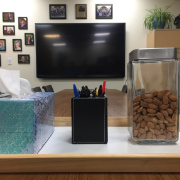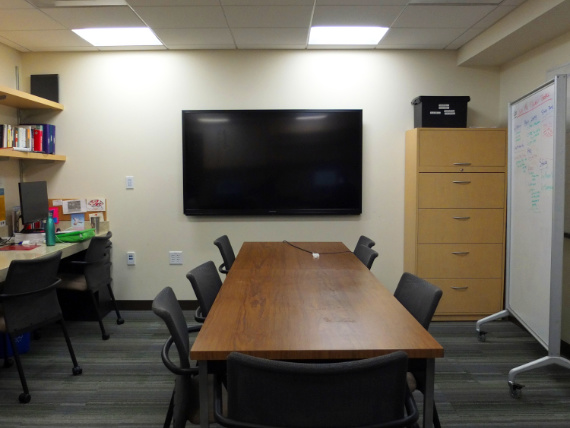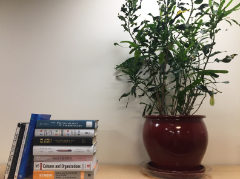- Toolkits
- Are You Ready to Talk?
- Beyond the Line
- Blocking Gender Bias
- Edgy Veggies
- First-Gen Ascend
- Fishbowl Discussions
- Measuring Mobility
- Peaceful Politics
- Plot the Me You Want to Be
- RaceWorks
- Rethinking Stress
- Space Reface
- Team Up Against Prejudice
- United States of Immigrants
- Kit Companion: Map Your Identities
- Kit Companion: LARA
- Collections
- Action Areas
- About

Six Plants Later, My Office Doesn’t Feel Like a Former Fish Lab
Stories From the Field
Six Plants Later, My Office Doesn’t Feel Like a Former Fish Lab
Ellen Reinhart, Stanford SPARQ’s research manager, reflects on using the Space Reface toolkit to improve her team’s work environment, which once served as a laboratory housing fish.


I didn’t expect taking care of a plant named “Hildegard von Croton” would be so much fun, but the joy I take in watering her every Monday morning is one of the happy surprises I encountered during a “space reface” of the SPARQ office.
The changes we made were cheap. They were simple. And in many unexpected ways, they were effective, making our workspace a happier place to be.
Here’s how I ended up having a new green friend named “Hildegard von Croton.”
The Changes
First, I posted a sign on the door with the SPARQ team members’ names and titles. It’s a small change, but seeing “Ellen Reinhart, Research Manager” as I walk into the office makes me feel like an important part of the team.
I also transformed a blank wall into a gallery of photos of my teammates. Much like the name sign, it gives me — and everyone else — a sense of pride and connection to our organization.
I enhanced the SPARQ snack bar. Instead of only stocking it with leftovers from our meetings, I turned to almonds, dried mangos, coffee, and loose-leaf tea. A healthy collection of food and beverages made me, my colleagues, and visitors to the office feel welcome and cared for.
Hildegard

Now, about that plant.
Hildegard von Croton, or Hildegard for short, is one of several plants I and my colleagues decided to put on our shelves. As prior research made us expect, the plants’ presence soothed us. It was something about taking care of another living thing, even if just a stem and some leaves in a pot. The plants also provided a great excuse to get out of our chairs to fetch water for our colorful creatures, giving our bodies much-needed rest from time spent sitting. The plants felt like pets in many ways, and it seemed natural and fun to give them names. Mine was a respectful nod to a female German scientist and the plant’s genus, croton.
My colleagues and I often share laughs as we tell jokes about the personalities we’ve projected onto our potted friends. What surprised me most about this camaraderie was that it — and other positive feelings arising from our newly welcoming office — enveloped just about everyone who dropped by.
Transforming our space ended up being about more than just improving how we felt at work. It was changing others, too — one sign, picture, snack, plant, and smile at a time.


